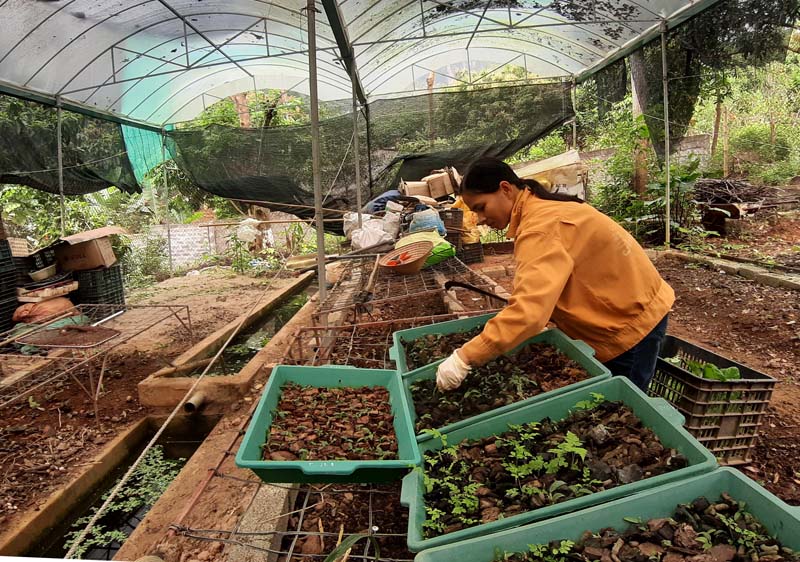
(HBO) – Hoa Binh province boasts relatively favourable natural conditions for growing medical herbs. Given this, a number of organisations and individuals have worked to develop large-scale medical herb farming zones, thus helping to provide jobs and raise income for locals.
 A
worker of the Biopharm Hoa Binh JSC examines medical herbs.
A
worker of the Biopharm Hoa Binh JSC examines medical herbs.
The Hoa Binh Medicine JSC, based in Hoa Son
commune of Luong Son district, specialises in growing, researching and
producing medical herbs, especially "xa den” (Celastrus hindsii Benth) which is
useful for health improvement. It carried out a scientific study which looked
into the chemical composition of the special herb and assessed the biological
activity of some compounds from this plant. The firm submitted its findings to
the authorised agency to seek a patent and is currently investing in a
production line. Some "xa den” derivatives have also been produced on a trial
basis.
Meanwhile, the INCA Vietnam JSC has coordinated
with relevant agencies and localities to create a sacha inchi growing area for
many years and reaped encouraging outcomes. Suiting the local mountainous
climate and soil conditions, the plant has developed well here and generated
relatively high economic benefits.
The growing area produced 1 – 1.3 tonnes of dry
fruit per ha in the first year and more than 3 tonnes since the third year,
with annual profit reaching 150 – 200 million VND (6,400 – 8,500 USD) per ha on
average.
INCA Vietnam said it plans to form a
concentrated sacha inchi farming zone in Hoa Binh and build a factory here to
process materials.
Via effective scientific research activities,
the Biopharm Hoa Binh JSC has successfully developed a cordyceps production
process and multiplied some available medical plants like ginseng, "thong dat”
(Palhinhaea cernua), "hoang tinh do” (Polygonatum kingianum Coll. et Hemsl.)
and "thong do” (Taxus wallichiana).
Hoa Binh boasts potential and advantages for
developing medical plant growing zones and producing medicines. In its plan on
developing medical herb farming areas until 2025, the province will focus on the
24 plants that it has strength in and cultivate them on over 2,800ha of land to
harvest about 14,000 – 20,000 tonnes of materials each year.
To that end, provincial authorities have been
assisting localities to convert ineffective farmland areas into those for
growing herbs in the long term, thus helping to improve the economic value on
the same farming area, create more jobs and raise income for locals, and
protect producers and consumers’ health and the environment.
Under the province’s instructions, localities in
Hoa Binh are reviewing areas zoned for herb farming, proposing support
policies, and inviting investment to medical herb cultivation and processing.
They are also building hi-tech production models, form connectivity between
producing and processing companies, and encouraging farmers to change crop
structures to develop concentrated medical herb growing zones./.
Hoa Binh province’s economy posted an impressive Gross Regional Domestic Product (GRDP) growth rate of 12.67% in the first quarter of 2025, representing a 12.76% year-on-year increase, the highest rate recorded since the beginning of the current tenure, according to the provincial Statistics Office. This robust growth reflects years of strategic groundwork and sets a strong foundation for the province’s annual growth target of over 10%.
With a focus on cash crop farming with science - technology application and brand building, Lac Thuy district is gradually increasing production value, improving people's life quality, and laying the foundation for sustainable socio-economic development.
In recent years, the economic development model "Hoa Binh Earthworm Farm” run by Mr. Bui Van Dang in Co Giua Hamlet, My Thanh Commune (Lac Son district) has not only brought stable economic value but it is also environmentally friendly, helping to protect and reduce pollution, contributing to the construction of a green and sustainable agriculture.
Dao Village’s honey – a product certified with a 3-star OCOP (One Commune One Product) rating by Thong Nhat Agricultural Cooperative in Dao Village (Hoa Binh City) – is highly regarded by consumers for its quality, richness, and variety in packaging. The distinctively sweet taste of Dao Village’s honey leaves a lasting impression on anyone who has tried it.
In alignment with Project No. 07-DA/TU, issued by the Hoa Binh provincial Party Committee on November 1, 2021, Lac Thuy district has actively promoted investment and supported the sustainable development of its industrial and handicraft sectors during the 2021–2025 period. Alongside this, the district has remained committed to preserving and revitalising traditional craft villages.
Located in the northern part of Lac Thuy district, with a temperate climate and fertile soil, Phu Thanh commune has great potential and advantages in growing tea. The long-standing experience, combined with strict adherence to organic farming practices in the tea gardens, ensures that the dried tea products from Phu Thanh and Lac Thuy as a whole are sold out immediately upon production, providing a stable and prosperous life for the local people.



 A
worker of the Biopharm Hoa Binh JSC examines medical herbs.
A
worker of the Biopharm Hoa Binh JSC examines medical herbs.